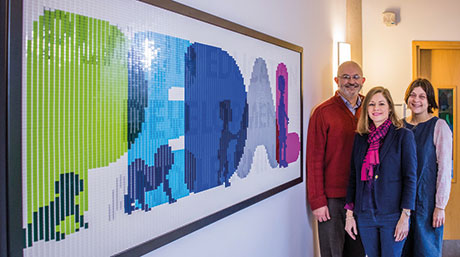
‘LEGO Professor of Play’ is a dream job title for lots of children – and a dream come true for many early years professionals is a new research Hub providing evidence that play is being taken seriously.
Paul Ramchandani was appointed LEGO Professor of Play in Education, Development and Learning at Cambridge University last year and leads a research team investigating the role of play in children’s early development along with a mission to inform wider practice and policy.
‘This is work that is hugely important and helpful for parents and teachers to help them to make decisions,’ says Prof Ramchandani. ‘Everyone agrees that play is important in children’s lives, especially in early childhood. While no-one would disagree with that, it is important that we are doing the right things and not assuming because it is seen to be right or nice that it must be the best way.
‘It is important to question the kinds of interactions and specific types of play that are important to child development. Everyone’s time and resources are limited, so knowing what is best is important.’
The Centre for Research on Play in Education, Development and Learning (known as PEDAL) is funded through a £4m grant from the LEGO Foundation – the charitable arm of the toy production company. Importantly, PEDAL’s direction of research is not imposed by the manufacturer.
‘While LEGO has practical experience in the world of play, it is recognised that it is important to have an independent voice,’ Prof Ramchandani says. ‘We have ongoing discussions but are independent scientists.’
THE BEST START IN LIFE
Prof Ramchandani is a trained doctor and led the Child and Adolescent Mental Health Group at Imperial College London before joining PEDAL. His research is focused on early child development and he has a particular interest in how we give children the best start in life. ‘Fathers have been a theme in my work for a long time – their role in children’s lives, how they play compared to how mothers play and if they link to bring better outcomes to children,’ he says.
The three main strands of PEDAL’s work are:
- How best to support parents and carers of children aged from birth to three years old.
- How children develop and sustain friendships.
- Devising and evaluating play-based approaches in early education.
When asked about the current Government’s view of play, Prof Ramchandani responds that there is a ‘mixed picture’. He says, ‘A concern that a lot of people have is assessment and the curriculum and how the targets are getting younger and younger and the space to play is getting pushed out.
‘The more that assessments and taught curriculum get put in to the early years, then it pushes out the opportunities for children to do their own learning through play. On the other hand, the Government has recently put out a document to support parents on interacting with their children through play and chatting, so it’s a mixed picture, but it’s a worry whether the balance is right. It is important that the Government follows the evidence.’
CURRENT THINKING
Prof Ramchandani hopes that the launch of the PEDAL Hub this month will help with the centre’s aim of engaging with policymakers and also make key findings and current thinking on play available to everyone (see box).
‘We will take key research from around the world, summarise and critique it,’ he explains. ‘The aim is to be able to comment on the research into play and help people to understand it with the ambition of interpreting scientific papers and making them accessible to all.’
PEDAL HUB
Practitioners who want to read current research on play to find inspiration, gain evidence to support their practice or for their own studies can now access the PEDAL Hub (www.pedalhub.net), which gathers research from PEDAL and other academic institutions and aims to make it accessible for a non-academic audience.
Along with links to research publications, videos of play experts and relevant websites, there are ‘Play Pieces’ written by PEDAL and other experts which summarise and comment on research evidence related to play. These include:
How are play and child development connected?
Why is pretend play so important?
How can play be used in the classroom to help children to develop new skills?
PEDAL Hub: www.pedalhub.net
Not all academic publications can be accessed online for free. You may be able to read them through a library or, if you are a student, with an institutional log-in. You could also download Unpaywall, which harvests legal open-access copies of journal articles: https://unpaywall.org
